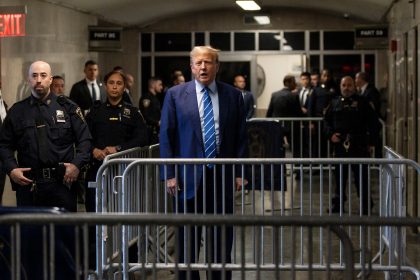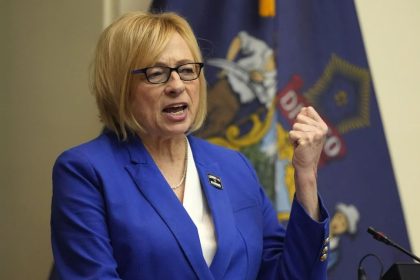Senators Propose Bipartisan Legislation to Update Electoral Count Act

WASHINGTON — A bipartisan group of senators proposed new legislation on Wednesday that would update the 135-year-old Electoral Count Act and prevent future attempts to meddle with the outcome of a federal election like those that played out after the last presidential race.
The legislation, really a pair of bills, is intended to guarantee a peaceful transition of power from one president to the next by making it more difficult for lawmakers to challenge a state’s electoral votes when Congress meets to certify the official count of the election.
The first bill also seeks to clarify that the vice president has no discretion over the results and sets out steps to guide a presidential transition.
The second bill would increase penalties for threats or other intimidation aimed at election officials, while also encouraging the U.S. Postal Service to improve its handling of mail-in ballots.
The bipartisan negotiations on the bills were led by Sens. Susan Collins, R-Maine, and Joe Manchin, D-W.Va.
The other senators involved in the negotiations were Rob Portman, R-Ohio, Kyrsten Sinema, D-Ariz., Mitt Romney, R-Utah, Jeanne Shaheen, D-N.H., Lisa Murkowski, R-Alaska, Mark Warner, D-Va., Thom Tillis, R-N.C., Chris Murphy, D-Conn., Shelley Moore Capito, R-W.Va., Ben Cardin, D-Md., Todd Young, R-Ind., Chris Coons, D-Del., Ben Sasse, R-Neb., and Lindsey Graham, R-S.C.
“From the beginning, our bipartisan group has shared a vision of drafting legislation to fix the flaws of the archaic and ambiguous Electoral Count Act of 1887,” the senators said in a joint statement.
“Through numerous meetings and debates among our colleagues as well as conversations with a wide variety of election experts and legal scholars, we have developed legislation that establishes clear guidelines for our system of certifying and counting electoral votes for president and vice president,” they said.
Though they conceded they don’t currently have the votes to overcome a Republican filibuster, they nevertheless urged their colleagues in both parties “to support these simple, common sense reforms.”
If the wording of the bills sounds familiar, it’s because both are geared to address specific steps former President Donald Trump and his supporters took from the close of polls on the night of the November 2020 election through to the riot at the U.S. Capitol on Jan. 6, 2021, and beyond.
In a press release, the senators said they developed the bills with input from state election officials, as well as from an ideologically diverse group of election experts and legal scholars, including the American Law Institute.
Rules Committee Chairwoman Amy Klobuchar, D-Minn., and Ranking Member Roy Blunt, R-Mo., also played key roles in drafting the bills.
“Debates over the political ‘rules of the game’ can be fraught with suspicion and jockeying for advantage. When these rules change, there must be buy-in from both parties to maintain trust in the system,” said Matthew Weil, executive director of the Democracy Program at the Bipartisan Policy Center, in a written statement.
“This bipartisan Senate framework is a critical step for shoring up ambiguities in the Electoral Count Act. These senators, especially Sens. Manchin and Collins, should be commended for finding common ground on a matter that is so foundational to our democracy: faith in the system that selects our leaders,” Weil said.
Bob Bauer and Jack Goldsmith, co-chairs of the Presidential Reform Project, also expressed their support for the legislation.
“Our work on these reform issues, which has included co-chairing a group of experts convened by the American Law Institute, has convinced us that major improvements in the current law are both urgent and achievable,” they said in a joint statement. “We believe the legislation as proposed will help curtail threats to future presidential elections that would erode the foundational democratic principles of our country. It merits broad support.”
The first bill, the Electoral Count Reform and Presidential Transition Improvement Act, is co-sponsored by Sens. Collins, Manchin, Portman, Sinema, Romney, Shaheen, Murkowski, Warner, Tillis, Murphy, Capito, Cardin, Young, Coons, Sasse and Graham.
The bill includes the following provisions:
Electoral Count Reform Act. This section would reform and modernize the outdated Electoral Count Act of 1887 to ensure that electoral votes tallied by Congress accurately reflect each state’s vote for president. It would replace ambiguous provisions of the 19th century law with clear procedures that maintain appropriate state and federal roles in selecting the president and vice president of the United States as set forth in the U.S. Constitution.
Presidential Transition Improvement Act. This section would help to promote the orderly transfer of power by providing clear guidelines for when eligible candidates for president or vice president may receive federal resources to support their transition into office.
The second bill, the Enhanced Election Security and Protection Act, is co-sponsored by Sens. Collins, Manchin, Portman, Shaheen, Romney, Sinema, Murkowski, Warner, Tillis, Murphy, Coons and Cardin.
The bill includes the following provisions:
Enhanced Penalties to Protect Our Elections Act. This section would double the penalty under federal law for individuals who threaten or intimidate election officials, poll watchers, voters or candidates. Under current law, threats of violence or intimidation against these individuals are punishable by no more than one year in prison. This penalty would be raised to no more than two years in prison.
Postal Service Election Improvement Act. This section aims to improve the handling of election mail by the U.S. Postal Service and provide guidance to states to improve their mail-in ballot processes where permitted under state law.
Election Assistance Commission Reauthorization. This section would reauthorize the Election Assistance Commission for five years and require the EAC to conduct cybersecurity testing as part of its testing and certification process for voting systems.
Established by the Help America Vote Act of 2002, the EAC is an independent agency that helps states improve the administration and security of federal elections. The EAC administers grants to states and develops non-binding guidance and best practices for election officials in various areas, including cybersecurity, election audits and voting accessibility.
The authorization for the EAC, which is led by two Republican and two Democratic commissioners, expired in fiscal year 2005, though the agency has continued to receive annual appropriations for operations.
Election Records Protection Act. This section would clarify that current law requires electronic election records be preserved. It would also increase the existing maximum penalties for individuals who willfully steal, destroy, conceal, mutilate or alter election records from $1,000 to $10,000 and from up to one year in prison to up to two years in prison. In addition, it would make it illegal to tamper with voting systems.
Dan can be reached at [email protected] and @DanMcCue
























